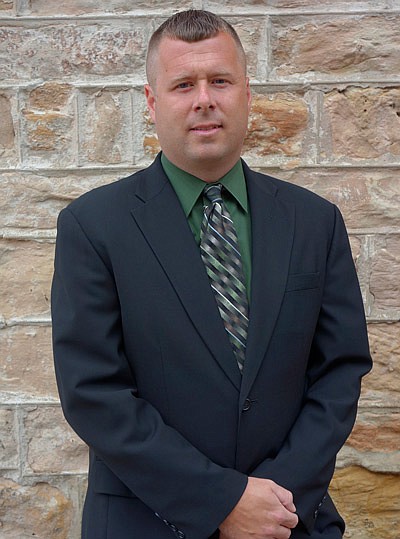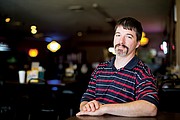Nearly two years ago, shots rang out just after noon on Canfield Drive in Ferguson, Missouri.
Soon afterward, police said an 18-year-old black man, Michael Brown, had been shot and killed by Darren Wilson, a white police officer. Wilson, just 10 years older than Brown, resigned Nov. 29, 2014, but was never charged in a court of law.
The story of what exactly happened Aug. 9, 2014, has been disputed. But the death of Brown, who was unarmed, caused existing tensions to erupt in Ferguson, a city comprised predominately of African Americans, according to the U.S. Census. The incident in Ferguson spurned peaceful candlelight vigils but deteriorated into looting, violence and vandalizing that lasted longer than a week.
Brown's funeral on Aug. 25 was attended by an estimated 4,500 people, according to news reports.
Off and on through early December, protests erupted in 170 cities, including St. Louis. "Hands up, don't shoot" became the slogan cried at many demonstrations. The entire nation became ultra sensitive to shootings by - and of - police officers and remains so today.
"The unrest never came to Fulton," Fulton Police Chief Steve Myers said. "We weren't seeing unrest in the smaller cities throughout the United States. I don't that it ever escalated past the Missouri River."
In 2014 and beyond, however, local officers of the law have taken notice as conflicts erupted in larger cities. Lt. Clay Chism, of the Callaway County Sheriff's Office, said despite the unrest, his fellow deputies felt and still feel supported by the people they serve.
"I would emphasize that immediately after Ferguson and immediately after Dallas and then Baton Rouge, our deputies have had a strong outpouring of community support expressed toward them," he said. "As recently as the last few weeks, we've had deputies go to pay for meals only to learn that someone anonymously paid for them."
Questions asked
Myers said Ferguson's unrest may have been incited by people who don't live there.
"I talked to police officers in Ferguson who said the local people were peacefully protesting, but it was outsiders that came in (inciting violence)," he said. "I think TV blew things out of proportion, too."
Many questions have been asked - and incidents highly reported - since the 2014 death of Michael Brown. Akai Gurley, 28, of Brooklyn, New York, was shot and killed by a police officer Nov. 20, 2104, in a stairwell, a shooting called an accidental discharge. On Nov. 22, 2014, Tamir Rice, 12, was shot and killed by Cleveland, Ohio, police after they mistook his toy gun for a real weapon. On April 4, 2015, Walter Scott, of North Charleston, South Carolina, died after being shot while running away from a police officer. Freddie Gray, of Baltimore, Maryland, died April 19, 2015, of a spinal cord injury a week after he was arrested and placed in a police van. His death sparked protests in Baltimore and across the nation.
On July 7 just a month ago - five Dallas police officers were ambushed and killed and nine more injured. On July 8, 9-year police officer Mike Flamion was shot and critically injured during a traffic stop in Ballwin, in west St. Louis County. On July 17, six police officers were shot in Baton Rouge, Louisiana, and three died.
In Fulton, 98 miles west of Ferguson, relations between law enforcement officers and the community have remained peaceful through it all - a result, perhaps, of good relationships purposefully constructed over time, law enforcement leaders said.
"Even before Ferguson, we have always participated in various community events," Chism said. "We've tried to have a strong presence in our local schools, with our day deputies stopping by whenever they can."
Myers said an outpouring of support has also been received by his police officers and staff.
"After Dallas, we had people stopping police officers and telling them how much they support them," he said. "We had more food dropped off than we could possibly eat. We're fortunate to live in Fulton, and people here support police officers."
Rev. Bobby Washington, of the Church of God in Christ in Fulton, who is black, said the story people in Fulton heard about Ferguson was heavily influenced by the media.
"There are times when you hear stories where someone has been mistreated, but you only see one side," he said. "So, you don't really get a true sense of what's going on."
Washington, however, said there is a racial divide in Fulton and believes he has been a victim of racial profiling by an officer.
"From my perspective, I've been pulled over by local officers in town for no reason," he said. "Statistics show that African Americans are more likely to be pulled over, from what I've seen."
Washington recalled a time when he was pulled over that he felt disrespected and was made uncomfortable by the officer.
"I pulled out of a driveway to drive a quarter-mile to my house," he said.
Before he arrived home, he saw lights flashing in his rear-view mirror and stopped for an officer.
"I told him I hadn't been drinking, and he demanded to smell my breath in a way that seemed unprofessional to me," he added.
After that incident, Washington told another police officer he'd felt uncomfortable during the encounter. Department officials investigated, and upon finding other complaints of that officer about racial profiling, they dismissed him.
"Once it was reported, they handled it very professionally," Washington said. "They didn't want anybody on the police force that would show any racial prejudice."
The way those police officers dealt with his situation is only one example of the good they do for the community, Washington said.
"We do have good police officers," he said. "They participate in the black community. It helps that in Fulton we have more community policing."
As police chief, Myers said he does his job with impartiality.
"I don't look at it as a black community or a white community," he said. "I really don't look at it that way - it's Fulton. And we're not the only community that feels that way."
Both Myers and Chism said there is a strong emphasis on creating and maintaining good community relations between residents and law enforcement agencies.
"We train our deputies to treat everyone with respect, regardless of race, color, sex or other," Chism said. "We sincerely want our deputies to be part of the community. In fact, most recently we enacted a policy that even reserve deputies have to be residents of Callaway County. We don't want this to be just a job in the community."
Myers said his officers recently helped the Rev. Charles Jackson, of Guiding Light Baptist Church, and children in that congregation.
"He has a reading program for the summer and invited all law enforcement officers in to read with the children," he said. "We just had 20 police officers there and firemen and EMS."
Over all, Washington attributes the peaceful relations between law enforcement officials and the African-American community to a good sense of community policing by the department. However, relationships can always improve, he added.
"Are there racial problems? Yes," he said. "We still have some things to work on, but we're heading in the right direction."
No candidates
Chism has been with the sheriff's office his whole career, starting Sept. 1, 2000, in the jail, then moving four months later to the law enforcement division. He is currently running for sheriff and represents the office as spokesman. When fully staffed, the office has 15 road deputies, two criminal investigators, one domestic violence investigator and a narcotics investigator assigned to the Mustang Task Force.
Myers started in law enforcement as a deputy with the Montgomery County Sheriff's Office. He came to the Fulton Police Department in 1997 and became chief of police in 2002. The police department is fully staffed with 27 officers, he said.
Both Myers and Chism said finding quality officers to hire is getting harder and harder. There just aren't many appropriate police academy candidates, they said.
"Enrollment at police academies is down tremendously," Myers said. "Normally we have 12 to 15 applicants, but we don't have any right now."
Chism said the sheriff's office remains uncompromising when selecting deputies.
"Common sense and personal character are two of the primary facets that make for a good police officer," he said. "We can send a deputy to training after training; however, they have to be of good personal character."
Recruitment of new hires has changed since Ferguson, Chism continued.
"In the last two weeks, I've heard of (police academy) classes cancelled, and lots of police academy classes are running at half capacity," he said. "The number of candidates has dwindled, and that's a tough predicament in law enforcement."
Chism emphasized he won't take just anybody and put them on the street.
"We are not going to just hire warm bodies," he said. "We have a commitment to the community to hire people of good character. It's gut wrenching to hear that some law enforcement agencies are lowering their standards just to hire officers, but we have not bought into that concept. We will continue to hire people of good character who can do the job effectively."
Both men said the Ferguson incident took them by surprise.
"There's events throughout history and my career, and I can tell you where I was when they happened, but not that one," Myers said.
"I certainly don't believe that local law enforcement knew Ferguson would turn into a long-standing movement," Chism said.
Myers and Chism reiterated their appreciation and that of their officers for the the kindness of Callawegians.
"We are blessed with having a lot of community support," Chism said. "It makes for a much better working environment when you work for a community that supports your role and as a whole community believes in law and order and wants you to do your job."


